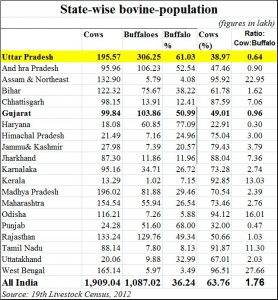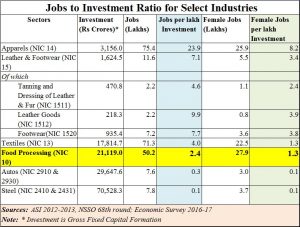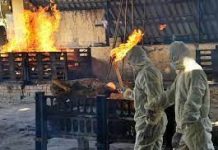https://www.moneycontrol.com/news/politics/comment-cattle-slaughter-ban-missteps-may-be-a-factor-in-the-bjps-electoral-woes-2579681.html
Cattle slaughter ban and politics
It will be interesting to see how the ruling party overcomes the grave mistakes it has made in the business of curbing cow and buffalo slaughter
The writing was on the wall since May 2017. Heady with the questionable success of the cow slaughter ban, the government allowed one of its ministries to recommend that even buffaloes could not be transported for slaughter.
 The government’s new rules tightening trade in livestock and transport of cattle to ensure their welfare at animal markets and also prevent smuggling were set aside by the courts, but the damage had been done. The government’s intentions were now suspect. It was seen to be baiting Muslims and the backward communities. And unfortunately, even Hindu owners of buffaloes began feeling resentful.
The government’s new rules tightening trade in livestock and transport of cattle to ensure their welfare at animal markets and also prevent smuggling were set aside by the courts, but the damage had been done. The government’s intentions were now suspect. It was seen to be baiting Muslims and the backward communities. And unfortunately, even Hindu owners of buffaloes began feeling resentful.
Overnight, the government had antagonised three key sections of society.
First the farmers. Many farmers had begun owning buffaloes because of the stigma attached to cow slaughter. Look at the numbers. Wherever cow vigilantes were the most fearsome, the population of cows had registered a decline, and the population of buffaloes had registered an increase. India’s move towards banning cow slaughter was endangering the cow population itself (http://www.asiaconverge.com/2017/03/cow-belt-makes-cows-an-endangered-species/).
But now even buffalo owners were being targeted. Obviously, if old and ageing buffaloes too could not be sold for slaughter, farmers would not get the (approximately) Rs.20,000 per cattle head that they could use for purchasing a younger lactating buffalo. It was hurting farmer economics. And this included a large number of Hindus as well.
 Second, the beef industry. This industry had already managed to become the second largest exporter of cattle meat in the world (http://www.asiaconverge.com/2017/06/saving-cow-comes-collateral-damage-jobs-exports-freedoms-votes/). Now this industry was being threatened, which in turn would hurt employees engaged in this trade – including butchers. Many Muslims are believed to be engaged in this line of business.
Second, the beef industry. This industry had already managed to become the second largest exporter of cattle meat in the world (http://www.asiaconverge.com/2017/06/saving-cow-comes-collateral-damage-jobs-exports-freedoms-votes/). Now this industry was being threatened, which in turn would hurt employees engaged in this trade – including butchers. Many Muslims are believed to be engaged in this line of business.
Third, the hide from animals invariably went to tanneries which in turn supported the leather industry. The ban on transporting buffaloes for slaughter hurt cobblers and employees of leather goods firms as well.
Look at the table alongside. The leather industry accounts for the maximum number of jobs for the least of investments. It is labour intensive and employs hundreds of thousands of people.
The two communities that were the most hit were the backward classes (the chamars are known to be engaged in the leather trade) and Muslims. Overnight both Dalits and Muslims felt resentful about the new rules promulgated by the government.
It was only a matter of time that both communities would come together. The first signs of this happening were evident when the great march of farmers took place in Maharashtra a few months ago. That was when both Dalits and Muslims began talking about marching under a unified banner.
It wasn’t long till the Samajwadi Party (which has a large following among Muslims) decided to join hands with Mayawati, the leader of the Bahujan Samaj Party (BSP) which had a large backward class following. The results are there for all to see.
The ruling party is doing all it can to break up such alliances. But the resentments run deep.
Once again, the law of unintended consequences was at work. Some political pundits thought that such laws would consolidate the Hindu vote. They forgot that the Hindus themselves are not a unified vote bank. The community embraces Dalits and liberals as well.
It will be interesting to see how the ruling party overcomes the grave mistakes it has made in the business of curbing cow and buffalo slaughter.






































COMMENTS